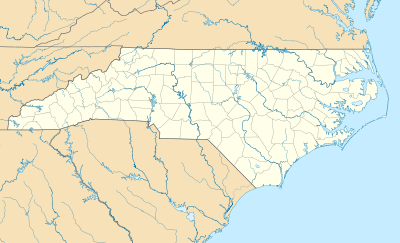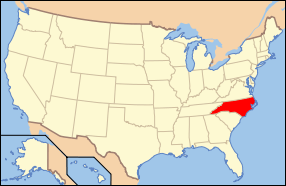Oak Island Light
 Oak Island Light House | |
 Oak Island Light | |
| Location | Oak Island, Cape Fear River, North Carolina |
|---|---|
| Coordinates | 33°53′34″N 78°02′06″W / 33.8929°N 78.035°WCoordinates: 33°53′34″N 78°02′06″W / 33.8929°N 78.035°W |
| Year first constructed | 1958 |
| Year first lit | 1958 |
| Foundation | Concrete-filled steel pilings |
| Construction | Portland concrete |
| Tower shape | Cylindrical |
| Markings / pattern | Bottom third of tower grey, second third white, third one black |
| Height | 153 feet (47 m) |
| Focal height | 169 feet (52 m) |
| Current lens | DCB-436 Aerobeacon |
| Intensity | 2,500,000 candlepower |
| Range | 16 nautical miles |
| Characteristic | Four flashes every 10 seconds |
| Admiralty number | J2470 |
| ARLHS number | USA-558 |
| USCG number |
2-0810 |
|
Oak Island Lighthouse | |
  | |
| Location | 300A Caswell Beach Rd., N of NC 133, Caswell Beach, North Carolina |
| Area | 5.7 acres (2.3 ha) |
| Architectural style | Lighthouse |
| NRHP Reference # | 07000293[1] |
| Added to NRHP | April 5, 2007 |
The Oak Island Lighthouse is next to the United States Coast Guard station in Caswell Beach, North Carolina and is owned by the Town of Caswell Beach.
History
Being completed in 1958, the Oak Island Lighthouse is one of the newest lighthouses in the United States. This lighthouse was built when Cape Fear Light (AKA the Skeleton Tower) was demolished. It is made from concrete and stands 153 feet (47 m) tall (with only 148 ft. above the ground) and is anchored by 24 pilings that are 67 ft. deep (10" round and filled with concrete). It replaced the Cape Fear Lighthouse, a steel skeleton lighthouse near Cape Fear on Bald Head Island. (That lighthouse was demolished afterwards to avoid confusion.) The lighthouse marks the mouth of the Cape Fear River, and from 1958 until 1962 it was the brightest lighthouse in the US and second most powerful beacon in the world, only surpassed by a French lighthouse along the English Channel. In 1962 it lost that distinction due to a change in the bulb technology used. The light is 169 feet above the water and can be seen for 16 nautical miles,[2] which is needed to mark the entrance to the Cape Fear River and help ships avoid the dangerous Frying Pan Shoals.
The characteristic flashing pattern for the light is four one-second flashes every ten seconds. It has become the symbol for Oak Island and can be seen on many of the souvenirs sold there.
The top 52 feet of the lighthouse are black; the middle 50 feet are white, while the bottom 40 feet are grey. The final 11 ft. are the aluminum and glass light enclosure. These colors are not painted on the structure, having instead been mixed into the concrete at the time the tower was constructed.[3]
Current status

In 2003 the Oak Island Lighthouse was designated as surplus by the Coast Guard, though it has continued operating the beacon. In 2004 the town of Caswell Beach was given ownership of the lighthouse and adjacent oceanfront property by the Federal Government in return for its agreement to maintain the property for parks and recreation purposes.[2] The lighthouse is open to the general public for tours to the second level (up just twelve steps) from Memorial Day through Labor Day on Wednesdays and Saturdays 10 A.M. - 2 P.M. for visitors aged seven or above. Tours to the top (up 131 ship ladder steps to an outside balcony) are offered year round (except for a few major holidays) for climbers aged nine or older. Many metal steps are nearly vertical; a style referred to as "ships ladders". Currently, light is produced from two separate 2.5 million candlepower aerobeam lenses. Reservations must be scheduled in advance by visiting the Oak Island Lighthouse web site at www.oakislandlighthouse.org.
References
- ↑ National Park Service (2010-07-09). "National Register Information System". National Register of Historic Places. National Park Service.
- 1 2 "Oak Island Lighthouse".
- ↑ Rowlett, Russ. "Lighthouses of the United States: North Carolina". The Lighthouse Directory. University of North Carolina at Chapel Hill.
- "Historic Light Station Information and Photography: North Carolina". United States Coast Guard Historian's Office. Retrieved 2009-08-12.
External links
![]() Media related to Oak Island Lighthouse at Wikimedia Commons
Media related to Oak Island Lighthouse at Wikimedia Commons


